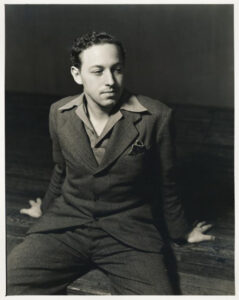Tennessee Williams
Tennessee Williams was one of the most important playwrights of the twentieth century.

Courtesy of the New York Public Library.
Black-and-white reproduction of a portrait of Tennessee Williams.
Tennessee Williams was one of the most important playwrights of the twentieth century. Usually grouped with other towering American dramatists with international reputations, such as Eugene O’Neill and Arthur Miller, Williams wrote numerous plays that frequently drew upon his childhood in the South and his subsequent residences in the region. Key among these sites was the French Quarter of New Orleans, which provides the setting for several of his plays, including A Streetcar Named Desire, considered by many critics to be his masterpiece. New Orleans also provides the setting for multiple short stories by Williams and figures prominently in his memoirs, letters, and notebooks.
Childhood and Education
Thomas Lanier Williams was born on March 26, 1911, to Cornelius Coffin William and Edwina Dakin in Columbus, Mississippi. Genteel Edwina lived with her parents, the Episcopal minister Walter Dakin and his wife, Rose, while C. C. Williams pursued a career as an itinerant salesman, escaping his troubled marriage. The couple’s first child, Rose Isabel Williams, was born in 1909, sixteen months before Tom, and the siblings remained close throughout their lives. Williams’s southern childhood in the rectory household of his beloved grandparents ended in 1918 when his father, promoted to the International Shoe Company’s headquarters, moved the family to St. Louis, Missouri. There a final child, Walter Dakin Williams, was born in 1919. Familial tensions proliferated, and Williams welcomed visits to his grandparents—particularly a European tour with his grandfather in 1928—and escapist creative writing.
After graduating from University City High School in 1929, Williams attended the University of Missouri and Washington University before earning a B.A. from the University of Iowa in 1938. The stresses of these years were numerous: emerging homoerotic desire; his parents’ crumbling marriage; mutual acrimony between Williams and his father; and his sister’s diagnosis of schizophrenia, her institutionalization, and her prefrontal lobotomy. And yet Williams, influenced by D. H. Lawrence, Chekhov, Ibsen, Rilke, and Hart Crane, wrote steadily, published a number of stories and poems, and saw his full-length plays Candles to the Sun and Fugitive Kind through productions in St. Louis.
Career
When Williams left St. Louis in 1938, he adopted the name Tennessee, subtracted three years from his age, and pursued gay relationships. The migratory life that emerged took him most frequently to New Orleans; Provincetown, Massachusetts; Key West, Florida; and New York City, as well as to Europe. With the assistance of agent Audrey Wood, who had been impressed by Williams’s collection of one-act plays, American Blues, he was awarded a Rockefeller Foundation grant. He also worked briefly as a scriptwriter at Metro-Goldwyn-Mayer in Hollywood, California. Both Battle of Angels, his play produced in Boston in 1940, and You Touched Me!, a collaboration with Donald Windham, were unsuccessful. The “memory play” The Glass Menagerie, however, triumphed both in Chicago in 1944 and in New York City the following year. The play won the New York Drama Critics’ Circle Award and marked Williams as a major American playwright.
Over the next two decades, Williams’s career reached its height with plays that were critical, popular, and financial successes and often were adapted into film soon after their stage debuts. None, though, was more noteworthy than A Streetcar Named Desire, which details the clash of the delicate Blanche DuBois and her bestial brother-in-law, Stanley Kowalski, in a setting just outside New Orleans’s French Quarter immediately after World War II. A major critical triumph, the play garnered the New York Drama Critics’ Circle Award and the Pulitzer Prize for drama. Less successful but still powerfully resonant with its setting of the Garden District of New Orleans was Suddenly Last Summer (1958), a Gothic play that detailed the struggle of a mother to silence narratives about her son’s homosexuality and subsequent death by cannibalism. Other plays of this era include Summer and Smoke (1948, revised as The Eccentricities of a Nightingale in 1964), The Rose Tattoo (1951), Camino Real (1953), Cat on a Hot Tin Roof (1955), Orpheus Descending (1958, a revision of Battle of Angels), Sweet Bird of Youth (1959), and The Night of the Iguana (1962).
Despite his primary focus on drama, Williams steadily wrote fiction throughout these years, publishing short-story collections and the autobiographical novel The Roman Spring of Mrs. Stone (1950). He likewise produced a collection of poems, In the Winter of Cities (1956), and the script to the controversial film Baby Doll (1956). In the 1940s and 1950s, Williams was in two long-term relationships, first with Pancho Rodriguez and then with Frank Merlo, whose death in 1963 devastated Williams.
Later Years
Throughout the rest of the 1960s and 1970s, Williams increasingly depended on drugs and alcohol, struggled with depression and hypochondria, and moved frenetically with the assistance of paid companions. Most critics felt that his artistic production suffered, and he faced accusations of self-plagiarism, especially as he compulsively wrote, rewrote, and retitled at all stages of production. Negotiating his institutionalization for drug addiction in 1959 and his break with agent Audrey Wood in 1971, he explored the intimacies of his own life in his late plays. These included The Two-Character Play, Out Cry, Small Craft Warnings, The Red Devil Battery Sign, Vieux Carré, A House Not Meant to Stand, and Something Cloudy, Something Clear. The same impulse seems to have propelled Memoirs (1975); his second novel, Moise and the World of Reason (1975); and his last collection of poems, Androgyne, Mon Amour (1977). Other late works include A Lovely Sunday for Creve Coeur, Clothes for a Summer Hotel, and The Notebook of Trigorin, an adaptation of Chekhov’s The Sea Gull.
Williams was found dead on February 25, 1983, in a New York City hotel, the Elysée. He was buried next to his mother in Calvary Cemetery in St. Louis.
